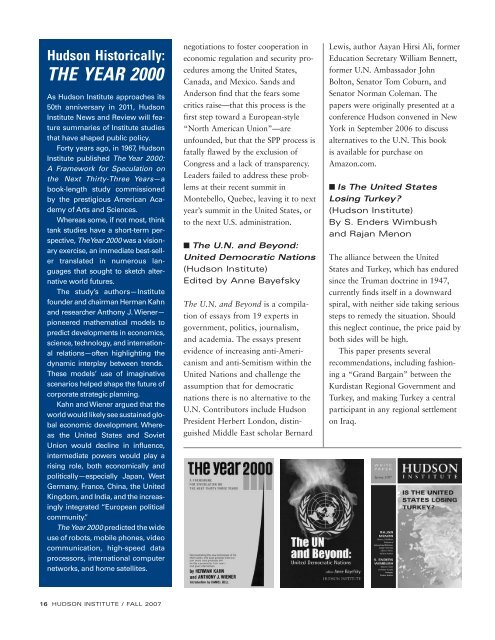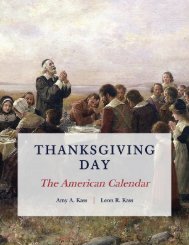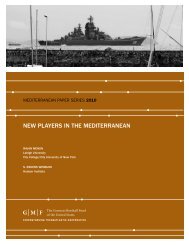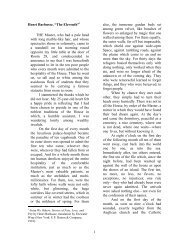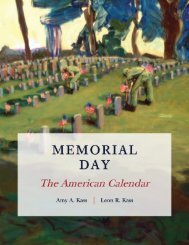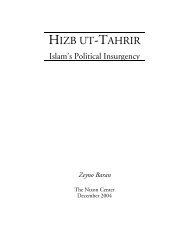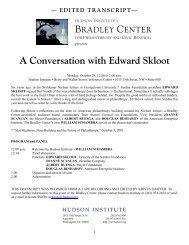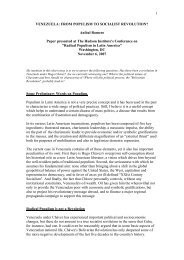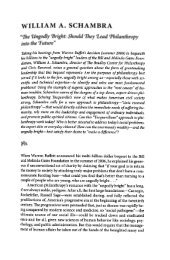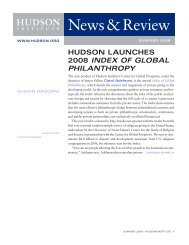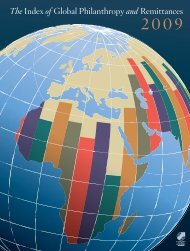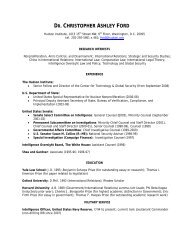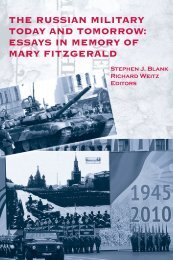Create successful ePaper yourself
Turn your PDF publications into a flip-book with our unique Google optimized e-Paper software.
<strong>Hudson</strong> Historically:<br />
THE YEAR 2000<br />
As <strong>Hudson</strong> <strong>Institute</strong> approaches its<br />
50th anniversary in 2011, <strong>Hudson</strong><br />
<strong>Institute</strong> News and Review will feature<br />
summaries of <strong>Institute</strong> studies<br />
that have shaped public policy.<br />
Forty years ago, in 1967, <strong>Hudson</strong><br />
<strong>Institute</strong> published The Year 2000:<br />
A Framework for Speculation on<br />
the Next Thirty-Three Years—a<br />
book-length study commissioned<br />
by the prestigious American Aca -<br />
demy of Arts and Sciences.<br />
Whereas some, if not most, think<br />
tank studies have a short-term perspective,<br />
The Year 2000 was a visionary<br />
exercise, an immediate best-seller<br />
translated in num erous languages<br />
that sought to sketch alternative<br />
world futures.<br />
The study’s authors—<strong>Institute</strong><br />
founder and chairman Herman Kahn<br />
and researcher Anthony J. Wiener—<br />
pioneered mathematical models to<br />
predict developments in economics,<br />
science, technology, and international<br />
relations—often highlighting the<br />
dynamic interplay between trends.<br />
These models’ use of imaginative<br />
scenarios helped shape the future of<br />
corporate strategic planning.<br />
Kahn and Wiener argued that the<br />
world would likely see sustained glo -<br />
bal economic development. Whereas<br />
the United States and Soviet<br />
Union would decline in influence,<br />
intermediate powers would play a<br />
rising role, both economically and<br />
politically—especially Japan, West<br />
Germany, France, China, the United<br />
King dom, and India, and the increasingly<br />
integrated “European political<br />
community.”<br />
The Year 2000 predicted the wide<br />
use of robots, mobile phones, video<br />
communication, high-speed data<br />
processors, international computer<br />
networks, and home satellites.<br />
negotiations to foster cooperation in<br />
economic regulation and security procedures<br />
among the United States,<br />
Canada, and Mexico. Sands and<br />
Anderson find that the fears some<br />
critics raise—that this process is the<br />
first step toward a European-style<br />
“North American Union”—are<br />
unfounded, but that the SPP process is<br />
fatally flawed by the exclusion of<br />
Congress and a lack of transparency.<br />
Leaders failed to address these problems<br />
at their recent summit in<br />
Montebello, Quebec, leaving it to next<br />
year’s summit in the United States, or<br />
to the next U.S. administration.<br />
■ The U.N. and Beyond:<br />
United Democratic Nations<br />
(<strong>Hudson</strong> <strong>Institute</strong>)<br />
Edited by Anne Bayefsky<br />
The U.N. and Beyond is a compilation<br />
of essays from 19 experts in<br />
gov ernment, politics, journalism,<br />
and academia. The essays present<br />
evidence of increasing anti-Ameri -<br />
canism and anti-Semitism within the<br />
United Nations and challenge the<br />
assumption that for democratic<br />
nations there is no alternative to the<br />
U.N. Con trib utors include <strong>Hudson</strong><br />
President Herbert London, distinguished<br />
Middle East scholar Bernard<br />
Lewis, author Aayan Hirsi Ali, former<br />
Education Secretary William Bennett,<br />
former U.N. Ambassador John<br />
Bolton, Senator Tom Coburn, and<br />
Senator Norman Coleman. The<br />
papers were originally presented at a<br />
conference <strong>Hudson</strong> convened in New<br />
York in September 2006 to discuss<br />
alternatives to the U.N. This book<br />
is available for purchase on<br />
Amazon.com.<br />
■ Is The United States<br />
Losing Turkey?<br />
(<strong>Hudson</strong> <strong>Institute</strong>)<br />
By S. Enders Wimbush<br />
and Rajan Menon<br />
The alliance between the United<br />
States and Turkey, which has endured<br />
since the Truman doctrine in 1947,<br />
currently finds itself in a downward<br />
spiral, with neither side taking serious<br />
steps to remedy the situation. Should<br />
this neglect continue, the price paid by<br />
both sides will be high.<br />
This paper presents several<br />
recommendations, including fashioning<br />
a “Grand Bargain” between the<br />
Kurdistan Regional Government and<br />
Turkey, and making Turkey a central<br />
participant in any regional settlement<br />
on Iraq.<br />
16 HUDSON INSTITUTE / FALL 2007


